|
|
|
Sort Order |
|
|
|
Items / Page
|
|
|
|
|
|
|
| Srl | Item |
| 1 |
ID:
083624
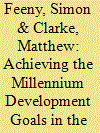

|
|
|
|
|
| Publication |
2008.
|
| Summary/Abstract |
Abstract: The Millennium Development Goals (MDGs) are a set of international development targets agreed to by members of the United Nations in 2000. The goals aim to improve many of the dimensions of extreme poverty and are to be achieved by 2015. This paper provides an overview of the issues relevant to the achievement of the MDGs in the Asia-Pacific region. The paper begins by discussing the critiques of the MDGs before assessing whether countries in the region are on track to achieve them. Issues relating to data availability and accuracy are discussed and the need to tailor the MDG targets to the special circumstances of some Asia-Pacific countries is examined. The paper proceeds by discussing the role of international assistance via international foreign development aid and non-governmental organisations in the achievement of the MDGs. The paper concludes with some policy implications for the international donor community.
|
|
|
|
|
|
|
|
|
|
|
|
|
|
|
|
| 2 |
ID:
084430


|
|
|
|
|
| Publication |
2008.
|
| Summary/Abstract |
Abstract: The Millennium Development Goals (MDGs) are a set of international development targets agreed to by members of the United Nations in 2000. The goals aim to improve many of the dimensions of extreme poverty and are to be achieved by 2015. This paper provides an overview of the issues relevant to the achievement of the MDGs in the Asia-Pacific region. The paper begins by discussing the critiques of the MDGs before assessing whether countries in the region are on track to achieve them. Issues relating to data availability and accuracy are discussed and the need to tailor the MDG targets to the special circumstances of some Asia-Pacific countries is examined. The paper proceeds by discussing the role of international assistance via international foreign development aid and non-governmental organisations in the achievement of the MDGs. The paper concludes with some policy implications for the international donor community
|
|
|
|
|
|
|
|
|
|
|
|
|
|
|
|
| 3 |
ID:
073522
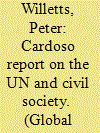

|
|
|
|
|
| Publication |
2006.
|
| Summary/Abstract |
The Report of the Panel of Eminent Persons on United Nations-Civil Society Relations was published in June 2004. It strongly endorsed the case for wider participation of civil society in all aspects of the UN's work, both at the headquarters and at the country level. However, the panel members displayed little understanding of the existing NGO consultative arrangements. Many of its recommendations were impolitic or impractical. The report was intellectually incoherent because it embodied three competing theoretical frameworks: functionalism, neocorporatism, and democratic pluralism. The functionalist emphasis on expertise and the neocorporatist emphasis on engaging stakeholders cannot offer criteria for participation on an all-embracing democratic basis. Reform is needed to provide facilities and resources to enhance participation by marginalized groups.
|
|
|
|
|
|
|
|
|
|
|
|
|
|
|
|
| 4 |
ID:
074028
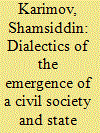

|
|
|
| 5 |
ID:
164329
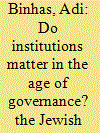

|
|
|
|
|
| Summary/Abstract |
The era of new governance in the last decades reflects the expanded space granted to the two non-state sectors – business and non-profit – in policy-making and implementation. By way of exploring whether and to what extent the institutional approach is still an effective method of analysing public policy, this article investigates the Jewish Agency for Israel as a case study, testing existing definitions for non-governmental organisations (NGOs and QUANGOs). The difficulty in finding the most appropriate definition serves as testimony to the feebleness of the institutional approach and the existing definitions for non-state players, and raises the need for new theoretical interpretations.
|
|
|
|
|
|
|
|
|
|
|
|
|
|
|
|
| 6 |
ID:
074791
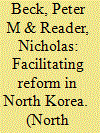

|
|
|
|
|
| Publication |
2006.
|
| Summary/Abstract |
For North Korea eventually to become a more stable and normal country, it needs to complete the transition from a command economy to a market economy. The international community can improve North Korea's chances of success by first taking advantage of the new opportunities to train North Koreans in financial, technical, and market economic skills. Additionally, the international community can address infrastructural constraints and undertake comprehensive needs assessments. North Korea will not receive significant international development assistance until it gives up its nuclear weapons. Increasing knowledge about the economy will improve the prospect that any deal reached on the nuclear issue will lead to transformation of the economy.
|
|
|
|
|
|
|
|
|
|
|
|
|
|
|
|
| 7 |
ID:
177893
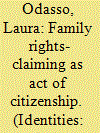

|
|
|
|
|
| Summary/Abstract |
Ethnographic and biographical research conducted with mixed-status couples and non-governmental organisations in France and Belgium provides insights into how the citizen partners of mixed-status relationships define and assert their family rights. In response to injustices suffered, from the state or from the migrant (non-citizen) partner, these citizens turned to organisations with contrasting discourses on marriage migration. These organisations encouraged them to participate in collective actions, and to give voice to their intimate experiences. Drawing on accounts of ‘intimate citizenship’, this article explores the citizenship-belonging nexus through lenses of performativity and intersectionality. Gender and ethnicity interact to influence interactions between citizen partners and the state, the tension between their virtual and actual social identities, and – ultimately – their assertions of citizenship, with personal status underpinning public claims. By speaking and acting in the name of their private lives and choices, these citizen partners affirm their (intimate) citizenship through its public performance.
|
|
|
|
|
|
|
|
|
|
|
|
|
|
|
|
| 8 |
ID:
189221
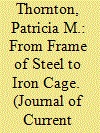

|
|
|
|
|
| Summary/Abstract |
As the Chinese Communist Party (CCP) celebrated its centenary, its expanding role in penetrating, regulating, and reshaping social organisations (社会组织, shehui zuzhi) seemed to signal a decisive shift in not only the arrangement, but also the balance, of power between the state, the voluntary sector, and the party in favour of the latter. Beginning with the recent reform “decoupling” professional associations and chambers of commerce (行业协会商会, hangye xiehui shanghui) from state management, which has been cited in official documents as a model for “separating the state from society” and an initial step in further reducing the state management in other realms of activity, this article considers broad trends in the CCP's historical relationship with social organisations, particularly alongside its shifting relationship with the state apparatus after 1949, over time. Working through both the CCP's governing practice of “documentary politics” and, more recently, initiatives to expand “rule by law” under Xi, I argue that the party has vastly increased its power, presence, and control over both as it marked its centenary, albeit at times donning the mask of the state to do so. I conclude that the party's continued advance under Xi is occurring at the expense of both the autonomy of the state administration and that of social forces.
|
|
|
|
|
|
|
|
|
|
|
|
|
|
|
|
| 9 |
ID:
073552


|
|
|
|
|
| Publication |
2006.
|
| Summary/Abstract |
Studies of global governance typically claim that the state has lost power to nonstate actors and that political authority is increasingly institutionalized in spheres not controlled by states. In this article, we challenge the core claims in the literature on global governance. Rather than focusing on the relative power of states and nonstate actors, we focus on the sociopolitical functions and processes of governance in their own right and seek to identify their rationality as practices of political rule. For this task, we use elements of the conception of power developed by Michel Foucault in his studies of "governmentality." In this perspective, the role of nonstate actors in shaping and carrying out global governance-functions is not an instance of transfer of power from the state to nonstate actors but rather an expression of a changing logic or rationality of government (defined as a type of power) by which civil society is redefined from a passive object of government to be acted upon into an entity that is both an object and a subject of government. The argument is illustrated by two case studies: the international campaign to ban landmines, and international population policy. The cases show that the self-association and political will-formation characteristic of civil society and nonstate actors do not stand in opposition to the political power of the state, but is a most central feature of how power, understood as government, operates in late modern society.
|
|
|
|
|
|
|
|
|
|
|
|
|
|
|
|
| 10 |
ID:
077554
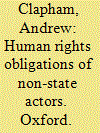

|
|
|
|
|
| Publication |
Oxford, Oxford University Press, 2006.
|
| Description |
xxxiii, 613p.
|
| Series |
The collected courses of the Academy of European Law; Vol XV/1
|
| Standard Number |
9780198298151
|
|
|
|
|
|
|
|
|
|
|
|
Copies: C:1/I:0,R:0,Q:0
Circulation
| Accession# | Call# | Current Location | Status | Policy | Location |
| 052445 | 323/CLA 052445 | Main | On Shelf | General | |
|
|
|
|
| 11 |
ID:
164030
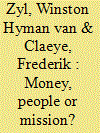

|
|
|
|
|
| Summary/Abstract |
Little is known about how ownership affects accountability in non-governmental organisations (NGOs). This article explores differences between locally- and non-locally-owned NGOs in South Africa. Our data suggest that locally-owned NGOs more often claim to implement downward and internal accountability mechanisms, while non-local NGOs more often claim to implement upward accountability mechanisms. Bigger NGOs also perform better at downward and upward accountability mechanisms than smaller ones. The data suggest there is much these organisations can learn from each other to strengthen their accountability mechanisms. Furthermore, assuming there is a positive relationship between local ownership and development effectiveness, these findings may have important implications in furthering effective development interventions.
|
|
|
|
|
|
|
|
|
|
|
|
|
|
|
|
| 12 |
ID:
142231
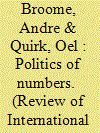

|
|
|
|
|
| Summary/Abstract |
Global benchmarks have grown exponentially over the last two decades, having been both applied to and developed by states, international organisations, corporations, and non-governmental organisations. As a consequence, global benchmarking is now firmly established as a distinct mode of transnational governance. Benchmarking chiefly involves the development of comparative metrics of performance, which typically take the form of highly stylised comparisons which are generated by translating complex phenomena into numerical values via simplification and extrapolation, commensuration, reification, and symbolic judgements. This process of translation takes what might otherwise be highly contentious normative agendas and converts them into formats that gain credibility through rhetorical claims to neutral and technocratic assessment. This politics of numbers has far-reaching ramifications for transnational governance, including the dimensions and effects of indirect power, expertise and agenda-setting, coordination, regulation and certification, and norm contestation and activism. This Special Issue draws upon an emerging literature to explore how and why benchmarks both align with and expand upon established models of International Relations theory and scholarship. It does so by critically examining the role of global benchmarks in key areas such as state ‘failure’, global supply chains, disaster management, economic governance, corporate social responsibility, and human development.
|
|
|
|
|
|
|
|
|
|
|
|
|
|
|
|
| 13 |
ID:
019453
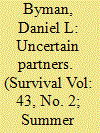

|
|
|
|
|
| Publication |
2001.
|
| Description |
p97-114
|
|
|
|
|
|
|
|
|
|
|
|
|
|
|
|
| 14 |
ID:
166683
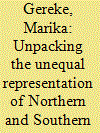

|
|
|
|
|
| Summary/Abstract |
Limited research has been done on non-governmental organisation (NGO) heterogeneity and its representation in global governance. Using the example of international climate change politics, we demonstrate that Northern and Southern NGOs tend to pursue different perspectives which are very unevenly represented in international climate change negotiations as NGOs from the Global North still constitute the large majority of NGOs taking part in these negotiations. In contrast to more hopeful outlooks, NGOs, hence, do not automatically contribute to a more democratic and legitimate global governance.
|
|
|
|
|
|
|
|
|
|
|
|
|
|
|
|
|
|
|
|
|